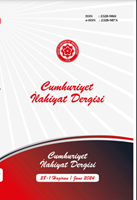Hayız Döneminde Kadını Kirli Sayan Kadim Anlayışın Sünnetteki Uygulamayla Kaldırılması
Abolishing the Ancient Concept of Considering Women as Impure During Menstruation Through the Sunnah
Author(s): Sehal Deniz VarlıkSubject(s): Gender Studies, Gender history, History of Islam, Sociology of Religion, History of Religion
Published by: Cumhuriyet Üniversitesi İlahyat Fakültesi
Keywords: Hadith; Sunnah;Women;Menstruation;Impure; Pure;
Summary/Abstract: It is an ancient understanding that monthly bleeding periods, which enable women to fulfill their sacred duty of ensuring the continuity of the human race, are ironically considered a cause of impurity. Feminist movements argue that during the matriarchal period at the beginning of human history, the menstrual cycle was seen as an extension of women's sacred fertility.For them, with the transition to patriarchy, the menstrual cycle became a cause of humiliation and impurity. however, these views are not justifiable. Historically, it is possible to find examples of women being considered as a source of blessing and healing during their menstrual periods as well as being regarded impure and contaminated. However, it can be said that the understanding regarding the menstruating woman is impure is more widespread. Especially in contemporary Judaism, a woman who menstruates as a consequence of being punished for her original sin in Paradise is ritually impure and must be isolated because she spreads her impurity on everything she touches.When the bleeding is over, she can be cleansed through special rituals. In fact, Judaism’s halakhah on the causes of ritual impurity and protecting the society from transmission of the impurityare quite detailed and complex. For Jews, leprosy is a cause of impurity, and a leper must be isolated, especially from the clergy.Although contemporary Christianity has been able to avoid the almost unenforceable burden of Judaism's regulations on menstruating women by ignoring them altogether, it generally continues the ontological understanding of the woman as responsible for original sin. In the case of lepers, they were cured by Jesus (pbuh) and became a recipient of God's mercy. Islam, on the other hand, does not place anyresponsibility on women for committing the original sin, nor does it consider menstruation as a cause of impurity. The Prophet Muhammad (pbuh), while explaining the verse about the menstruating woman, emphasized that it is a wrong interpretation to consider women impure and isolate them.On the contrary, he demonstrated the truth that women during this period are pure both in his words and in his practices. The narrations revealing that the Sunnah-compliant behavior is to continue the relationship with the menstruating wife, except for full sexual intercourse, are numerous. First of all, there are narrations from the mothers of the believers, who had first-hand knowledge of the subject, and other Companions explaining that the Prophet continued to use the same bed and quilt, eat and drink together with his menstruating wife and that the menstruating woman's hands, clothes unless they were stained with blood, and saliva were pure. Nevertheless, the debates and misapplications around the issue continued during the tabien period. This example illustrates the difficulty of changing old beliefs. In addition, the menstruation of women is discussed in the Islamic literature mostly from a fiqh point of view. This is because women's presence during this period has implications for worship and transactions.However, there is a tendency to overlook the significance of the Prophet's teaching of rejecting beliefs about women's inherent guilt and deserving punishment, which are rooted in the creation narrative. A neglected aspect of the issue is the Sunnah's emphasis on showing affection, interest and support to the menstruating woman, who is described in the Qur'an as suffering. However, just as the leper was transformed by Jesus Christ from an unclean person to be avoided into a servant of God worthy of healing by a prophet, the menstruating woman was transformed into a spiritually pure person to live with by practicing the Sunnah of the Prophet Muhammad.
Journal: Cumhuriyet İlahiyat Dergisi
- Issue Year: 28/2024
- Issue No: 1
- Page Range: 202-219
- Page Count: 18
- Language: Turkish

